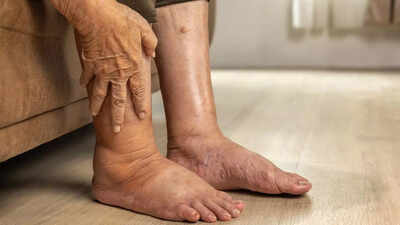Chronic Sleep Deprivation: This ONE unhealthy habit can negate ALL benefits of exercise, according to top neurologist |

We often think that if we are exercising (even vigorously), then we are healthy. However, while usually that is somewhat true, exercise alone is not enough to ensure overall health benefits. Not only that, there are some things that can in fact, negate the effects of exercise, and cannot offset it later on. According to Dr. Sudhir Kumar, neurologist at Apollo Hospitals Hyderabad, that habit is chronic sleep deprivation. Let’s see how…Exercise vs. Sleep: The heart health equationMany people assume that their heart health will improve through daily high-intensity physical activity. In a post on X, Dr. Kumar presents two different scenarios to prove his point about this misconception. A 40-year-old person who exercises vigorously for 40 minutes each day, while getting only 5-6 hours of sleep, will face different health outcomes than someone who sleeps 7-8 hours nightly, while exercising at a moderate pace through brisk walking. The person who sleeps well and exercises moderately shows, better heart disease protection than the person who exercises intensely but sleeps poorly. The heart benefits from exercise become useless when someone lacks sleep, because sleep deprivation leads to blood pressure elevation, insulin resistance and inflammation that damage cardiovascular health.

Chronic lack of sleep=recipe for disasterAccording to Dr. Kumar, the sympathetic nervous system becomes active when you lack sleep for extended periods, leading to increased heart rate and elevated blood pressure. The body experiences elevated inflammation levels while its metabolic functions become disrupted, which results in insulin resistance and weight accumulation. The heart disease risk factor known as coronary artery calcification becomes more likely, when these changes occur in the body. The lack of sleep makes it difficult to control hunger and hormones, which results in poor health maintenance. People who exercise regularly face a 20-40% elevated risk of cardiovascular disease, because of this combination.How much to sleepPeople who sleep less than six hours per night face elevated risks of developing heart problems, and they become more likely to develop obesity, diabetes, and experience strokes and depression. Dr. Kumar states that sleeping more than nine hours per night too, can be detrimental to health, although the negative effects of oversleeping tend to be less severe, than those of sleep deprivation. People need to establish regular sleep patterns while avoiding screens before bedtime, and learning stress management techniques, to achieve healthy sleep duration. According to Dr Kumar, “If the first person could extend sleep to 7 hours without reducing training much (30–35 min runs), that would give the best overall protection.”

Sleep plays an essential roleDuring sleep, the body performs essential functions which include memory strengthening, toxin elimination, mood regulation and improved mental clarity. The brain shows accelerated aging when sleep quality deteriorates, because it fails to remove beta-amyloid proteins which cause Alzheimer’s disease. The brain develops memory problems and attention span decreases, while becoming more vulnerable to depression and anxiety when this process continues. Sleep functions as an essential period for brain maintenance, which supports long-term neurological wellness.Can you make up for lost sleepSometimes, people sometimes need to sacrifice their sleep because of their work responsibilities, and personal obligations. In such a case, doctors suggest taking daytime naps as a way to recover from lost sleep. The body can recover from sleep deprivation through napping, but nighttime rest provides better results for maintaining healthy circadian rhythms, and achieving optimal restorative effects.Key takeawayHence, according to Dr Kumar, “Sleep is a non-negotiable foundation for cardiovascular and metabolic recovery. Exercise cannot fully counteract the chronic physiologic stress and inflammation caused by insufficient sleep.”Here are some ways to achieve better sleep quality and maximize your exercise outcomes, while lowering your risk for cardiovascular diseases…
- Establish a fixed bedtime and wake-up times on all days, including weekends.
- Establish a relaxing pre-sleep routine, which includes screen avoidance and stimulating activity prohibition, for at least one hour before bedtime.
- Stay away from caffeine, heavy meals and alcohol consumption during the hours leading up to bedtime (a minimum of 6 hours prior) because these substances disrupt sleep quality. The first step should be to do some physical activities throughout the day, but focus on morning exercises because they help people fall asleep faster and sleep longer.
- Use relaxation methods including meditation and deep breathing, to handle stress levels.
- People who experience sleep disorders such as apnea and restless leg syndrome, need to consult doctors because these conditions affect their ability to get quality sleep.






